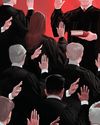
Alvin Taylor still remembers the sight each day as he’d return from school, of more houses in his neighborhood being burned to the ground. He was about 8 years old when the fires came for his home. Fenita Kirkwood recalls listening, as a 9-year-old girl, to her father arguing with men who had come to their doorstep to insist they had to leave. “That big yellow bulldozer pulled up in front of our house on a Friday,” remembers Lawrence Williams, who ran inside to fetch his mother. “I came in later and she was in the kitchen crying, asking God, ‘What are we going to do?’”
They were all children at the time, living in Section 14, a small plot of tribal land near downtown Palm Springs, California, in the mid-1960s. The city itself remained strictly segregated, and so their parents had helped to build a sort of shantytown out of trailers, wooden shacks, and small concrete dwellings—a mixed-race community that housed many of Palm Springs’ working-class Black residents. “We built a thriving community. There were businesses, churches…It was an actual village where people helped raise each other’s children, and we borrowed eggs from next door,” explains Pearl Devers, who was 12 years old when a change in federal law eased development restrictions on federal land—meaning there was significant money to be made by clearing residents from it.
The city condemned their properties, then proceeded to burn Section 14 to the ground. State officials later wrote that it amounted to a “city-engineered holocaust,” concluding, “Palm Springs ignored that the residents of Section 14 were human beings.”
Esta historia es de la edición July/August 2024 de Mother Jones.
Comience su prueba gratuita de Magzter GOLD de 7 días para acceder a miles de historias premium seleccionadas y a más de 9,000 revistas y periódicos.
Ya eres suscriptor ? Conectar
Esta historia es de la edición July/August 2024 de Mother Jones.
Comience su prueba gratuita de Magzter GOLD de 7 días para acceder a miles de historias premium seleccionadas y a más de 9,000 revistas y periódicos.
Ya eres suscriptor? Conectar

In the Name of the Mother - How Shyamala Gopalan Harris raised a presidential contender
Shyamala Gopalan Harris did not believe in coddling. Pay her daughters, Kamala and Maya, an allowance for doing chores? “If you do the dishes, you should get two dollars,” scoffed the woman who this past summer, almost two decades after we spoke, would launch a million coconut memes. “You ate from the damn dishes!” Reward the future vice president of the United States—and possible future president—for good grades? Ridiculous. “What does that tell you?” her mother chided. “It says, ‘You know, I really thought you were stupid. Oh, you surprised Mommy!’ No.”

Kill the Messenger - The anti-disinformation field is retreating under attack.
A few months ago, a man crawling along a rooftop in Pennsylvania tried to murder Donald Trump at a campaign rally. Hours later, press releases started to circulate, from analysts, think tanks, politicians, and pundits, all offering to cut through the swell of confusion and misinformation.

Food + Health / Global Warning - Why Project 2025 is an environmental catastrophe in the making
When President Joe Biden took office, Democrats held a slim majority in the House of Representatives and a single-vote edge in the Senate. Despite the monumental odds, he has presided over the most productive presidential term for climate action in American history. Under Biden’s direction, the federal government took up the arduous task of incorporating climate considerations into scores of administrative operations and procedures. The epa cracked down on superpollutants and issued stricter emissions regulations for passenger vehicles. The Inflation Reduction Act, the biggest climate spending bill Congress has ever passed, brings the nation closer to its goal of slashing carbon emissions in half by 2030.

Trumpnesia - To get a second chance, Trump needs voters to forget his disastrous presidency.
One of the most oft-quoted sentences ever penned by a philosopher is George Santayana’s observation that “those who cannot remember the past are condemned to repeat it.” In 2024, this aphorism is practically a campaign slogan. Donald Trump, seeking to become the first former president since Grover Cleveland to return to the White House after being voted out of the job, has waged war on remembrance. In fact, he’s depending on tens of millions of voters forgetting the recent past. This election is an experiment in how powerful a memory hole can be.

WHEN IN DROUGHT
This obscure yet adaptable grain could be a healthy staple for a warming planet.

BAD HABITS
A spate of recent horror movies recycle tired tropes about nuns-and reveal society's ongoing discomfort with independent women.

Taking the Fifth For a glimpse of the Supreme Court after a second Trump term, look at the radical circuit court that's already driving America to the right.
Imagine obamacare is dead and millions of Americans have lost health coverage.

THE ARCHITECT
TRUMP WANTS TO BE KING. RUSS VOUGHT HAS A PLAN TO MAKE IT HAPPEN.

Losing Faith
As an evangelical leader, I enticed lawmakers and federal judges to adopt a conservative Christian agenda. Donald Trump’s rise proved how wrong I was.

GOD'S COUNTRY
These Christian nationalists have a plan to take over Americafrom small towns to the highest court in the land.